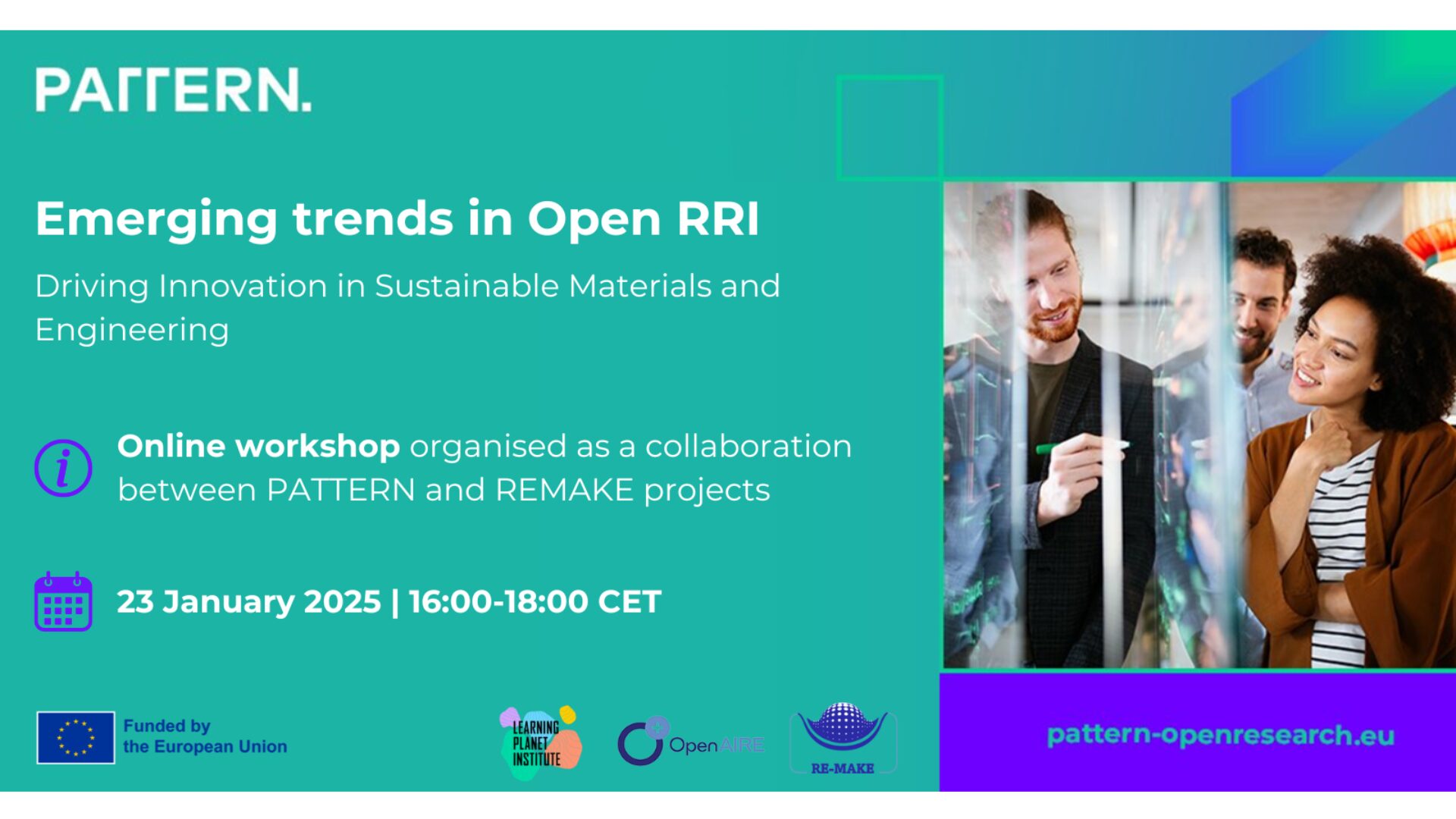News
Exploring Innovation: Highlights from the PATTERN-REMAKE Workshop
On January 23, 2025, the two EU funded Projects’ PATTERN Open Research and REMAKE joined forces to co-organize a Workshop that brought together more than 60 researchers, facilitators, and practitioners to explore emerging trends in Open and Responsible Research and Innovation (Open RRI). Held as a hybrid event, the workshop seamlessly connected participants across Europe, blending online collaboration with in-person engagement at the Politecnico di Milano.
A Step Towards Transformative Research in Material Sciences and Engineering
Organized under the PATTERN Open Research Project, a European initiative dedicated to promoting Open RRI, the workshop focused on equipping researchers with practical tools, transferable skills, and innovative methods to tackle societal challenges. Participants ranged from early-career researchers to seasoned experts, all sharing a common goal: to integrate Open Science principles in their work.
The workshop agenda addressed critical themes:
- The difference between Open Science and Open RRI, and why both are crucial.
- Tools and methods for FAIR data management and fostering citizen engagement in research.
- Sustainability research, focusing on circular economy and material lifecycle analysis.
Interactive and Engaging Activities
The workshop activities were designed to foster collaboration and creativity through the Miro platform, which facilitated group discussions and brainstorming sessions. Participants were divided into six groups, each guided by a facilitator, to engage in two key activities:
Activity 1: Group Formation and Role Assignment
- Step 1: Participants began by selecting a card from a Dixit-like board that best represented them, introducing themselves by sharing their background, talents, and motivations for attending the workshop. This icebreaker encouraged connection and a deeper understanding among group members.
- Step 2: Each group assigned specific roles: a timekeeper, moderator, scribe, and linker. These roles ensured smooth and efficient collaboration throughout the activities.
Activity 2: Identifying and Solving Challenges
Groups were invited to choose one contextual challenge from the board, such as:
- Engaging citizens in research and engineering projects.
- Creating sustainable research and production lifecycles.
They were tasked with analyzing challenges, identifying needs and methods, and selecting two main lines of action. Solutions were divided into short-term, mid-term, and long-term strategies, ensuring both immediate impact and sustained relevance.
- Documenting and Sharing Projects
To finalize their efforts, participants registered their outcomes on the PATTERN’s Project platform, creating a detailed project document that outlined their findings and proposed actions. These projects provided tangible outputs for the workshop and created opportunities for future collaboration.
- Final Group Discussion
The event concluded with a live discussion where both online and in-person teams shared their solutions. This interactive session allowed groups to pitch their ideas, exchange feedback, and reflect on key takeaways.
Key Reflections and Outcomes
The PATTERN- REMAKE Workshop was a resounding success, as participants embraced the hands-on exercises to produce actionable insights. Highlights included:
- Final Group Discussion: Key Insights
The event concluded with a live discussion where both online and in-person teams shared their solutions. One of the most insightful discussions centered around engaging citizens in research and engineering projects.
Participants highlighted several challenges and proposed solutions:
Challenges Identified:
- Difficulty in achieving a better understanding of the target group.
- Lack of knowledge about Open Science and RRI within the general public.
- Need for better two-way communication between researchers and society.
Identified Needs and Problems:
- Bridging the gap between the research community and society.
- Addressing the split between STEM (Science, Technology, Engineering, Mathematics) and SHS (Social and Human Sciences).
- Scientists need to improve communication skills to reach broader audiences.
Methods and Tools Suggested:
- Use social media with clear messages to engage the public.
- Utilize memes and storytelling to make scientific concepts more relatable.
- Introduce more interdisciplinary programs to connect different fields of study.
- Link science with different generations to reach non-scientific communities.
- Make science fun by using engaging formats beyond traditional academic publishing.
- Shift from a publication-based approach to one that emphasizes accessible content.
Proposed Solutions:
- Promote content creation across different platforms to reach diverse audiences.
- Enhance the curriculum of engineering and science subjects to include communication training.
- Shift the approach to scientific dissemination, prioritizing accessibility and engagement over technical jargon.
The discussions underscored the need for a paradigm shift in how research is shared and communicated, ensuring that scientific knowledge is accessible, engaging, and impactful for society at large.
One of the facilitators reflected on her first experience with the Pattern project:
“It was really engaging to see how participants addressed diverse challenges and shared innovative solutions. The collaboration between online and in-person teams was seamless, and the design-thinking exercises were a great success.”
A Platform for Future Collaboration
The success of this workshop underscores the potential of Open RRI to drive impactful research and innovation. Facilitators Andrea Giraldo Sevilla (Learning Planet Institute) Theodora Kavvadia (OpenAIRE) and APRE facilitators played a pivotal role in creating a dynamic environment that encouraged creativity and collaboration in this blended training event.
Participants will receive a follow-up recap, including access to the Miro board and their group’s contributions, to inspire ongoing exploration of Open Science principles.
Join the Movement
Workshops like this showcase the transformative potential of Open RRI. By fostering collaboration and equipping researchers with innovative tools, the PATTERN Project is paving the way for impactful research that bridges science and society.
Download the presentation of the workshop here!
Watch the recording here!
By logging into Projects Platform you can get the presentation material & exercise here (to have access to the results, outputs and presentations, please register first here).
The workshop numbers
- Total number of registrations : 103
- Total number of online participants: 40
- Total number of onsite participants: 20


